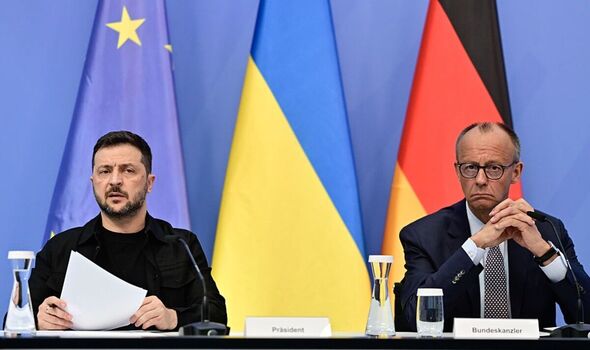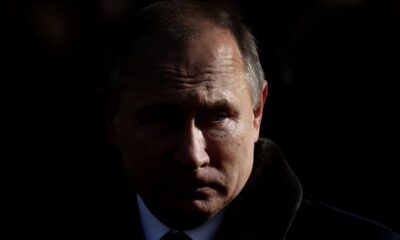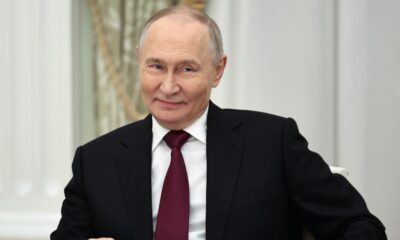World
Germany Calls on Ukraine to Halt Young Men Fleeing War

Germany’s Chancellor, Friedrich Merz, has urged Ukrainian President Volodymyr Zelensky to take measures to stop the increasing number of young men fleeing to Germany. This request follows a significant change in Ukraine’s exit policies, which relaxed restrictions for men aged under 25 at the end of August. Previously, all men between the ages of 18 and 60 were prohibited from leaving the country due to ongoing military conscription linked to the war with Russia.
The relaxation of these rules has led to a notable surge in the number of young Ukrainian men entering Germany. Data from the German Interior Ministry reveals a dramatic increase from approximately 19 arrivals per week in mid-August to between 1,400 and 1,800 by October 2023. This influx has raised concerns within the German government, prompting a direct appeal from Merz to Zelensky during a recent phone call.
In his conversation with Zelensky, Merz emphasized the need for young Ukrainians to remain in their country to contribute to its defense. He stated, “In a lengthy telephone conversation today, I asked the Ukrainian president to ensure that young men in particular from Ukraine do not come to Germany in large numbers — in increasing numbers — but that they serve their country. They are needed there.”
The rising number of young emigrants has sparked anxiety among members of Merz’s ruling coalition, who fear that public support for Ukraine could diminish if it appears that young Ukrainians are evading military service by settling in Germany. Additionally, there are concerns that this situation could be exploited politically by the far-right party, Alternative for Germany (AfD), which has gained traction in recent polls. The AfD has criticized Germany’s ongoing support for Ukraine and is advocating for the cessation of welfare payments to Ukrainian refugees.
Currently, around 490,000 working-age Ukrainians receive long-term unemployment benefits in Germany, as reported by the country’s employment agency. In response to the growing concern, the German government is working on legislation aimed at reducing these benefits for Ukrainian refugees. Merz noted, “In Germany, the transfer payments for these refugees will be such that the incentives to work are greater than the incentives in the transfer system.”
Germany has provided substantial support to Ukraine, welcoming over 1.2 million refugees since the onset of the conflict in February 2022. The country stands as the largest military aid provider to Ukraine after the United States, highlighting its commitment to supporting Kyiv during this ongoing crisis.
As the situation continues to evolve, Germany’s call for Ukraine to reconsider its exit policies reflects the complex interplay of humanitarian considerations and national defense strategies amidst the war’s persistent challenges.
-

 Entertainment3 months ago
Entertainment3 months agoAnn Ming Reflects on ITV’s ‘I Fought the Law’ Drama
-

 Entertainment4 months ago
Entertainment4 months agoKate Garraway Sells £2 Million Home Amid Financial Struggles
-

 Health3 months ago
Health3 months agoKatie Price Faces New Health Concerns After Cancer Symptoms Resurface
-

 Entertainment2 weeks ago
Entertainment2 weeks agoCoronation Street Fans React as Todd Faces Heartbreaking Choice
-

 Entertainment3 months ago
Entertainment3 months agoCoronation Street’s Carl Webster Faces Trouble with New Affairs
-

 World2 weeks ago
World2 weeks agoBailey Announces Heartbreaking Split from Rebecca After Reunion
-

 Entertainment3 months ago
Entertainment3 months agoWhere is Tinder Swindler Simon Leviev? Latest Updates Revealed
-

 Entertainment4 months ago
Entertainment4 months agoMarkiplier Addresses AI Controversy During Livestream Response
-

 Science2 months ago
Science2 months agoBrian Cox Addresses Claims of Alien Probe in 3I/ATLAS Discovery
-

 Health5 months ago
Health5 months agoCarol Vorderman Reflects on Health Scare and Family Support
-

 Entertainment4 months ago
Entertainment4 months agoKim Cattrall Posts Cryptic Message After HBO’s Sequel Cancellation
-

 Entertainment3 months ago
Entertainment3 months agoOlivia Attwood Opens Up About Fallout with Former Best Friend





















